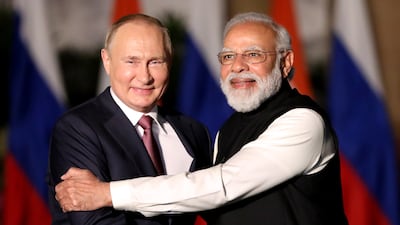Live updates: follow the latest news on Russia-Ukraine
India’s diplomatic position on the Russia-Ukraine war may upset the West, but the South Asian nation will stick to its independent stance to safeguard its geopolitical interests, political analysts have said.
“India has been trying to do this balancing act," Sanjay Kumar Pandey, a professor at Jawaharlal Nehru University’s Centre for Russian and Central Studies, told The National. "First and foremost, because Russia has been a reliable partner and a dependable ally.”
New Delhi has abstained on all the five West-sponsored resolutions against Russia on Ukraine in the UN that condemned Moscow’s military offensive on the East European neighbour since February 24.
India, despite having strong ties with the US and the EU to counter China in the Asia-Pacific region, has refused to denounce actions by Russia.
Instead, it made customary statements and called for countries to respect “commitment to the principles of the UN Charter, to international law and respect for sovereignty and territorial integrity of all states”.
“Keeping in view the totality of the evolving situation, India decided to abstain,” T S Tirumurti, India's permanent representative to the UN, said last week ahead of the UN General Assembly vote.
Russia and India share historical ties and have been time-tested friends.
New Delhi’s focus has mainly remained on evacuating its nationals – at least 20,000 Indians, mostly medical students – from Ukraine as it tries to sidestep the global pressure.
Over the past two weeks, Prime Minister Narendra Modi spoke with both Ukrainian President Volodymyr Zelenskyy and Russian President Vladimir Putin and called for “cessation of violence”, while urging them to use diplomacy and dialogue to resolve the conflict.
But as the US and Europe move beyond the diplomatic bluster, a global alliance is forming to turn Russia into a pariah state, with a slew of crippling sanctions being imposed on Moscow.
India’s continued neutral stand on the conflict has put it and its western allies in a fix.
Its stand on Russian actions has already ruffled feathers in the West, particularly in the US power corridors, as several Congressmen have demanded New Delhi clear its stand on its relationship with Russia.
There were murmurs of India finding itself on the list of countries sanctioned by the US Administration under Countering America’s Adversaries through Sanctions Act, or CAATSA, for buying military equipment from Moscow.
The move could be a jolt to the growing bonhomie between Washington and New Delhi.
Still, experts say New Delhi will continue to follow its independent diplomacy, despite pitfalls to protect its geopolitical interests.
Russia remains a critical source of weapons and military technology for India from where it sources around 85 per cent of the country’s military equipment.
Military hardware ranging from missiles, guns to nuclear submarines, India has major defence deals with Russia.
The two countries recently inked deals on supplying 750,000 AK-203 assault rifles and a $5.43 billion worth deal for S-400 ‘Trimuf’ missile systems.
“We majorly depend on Russia for our military supplies and inputs for sophisticated weapon systems, including technology,” Mr Pandey said.
New Delhi was a close ally of the Soviet Union during the Cold War era and over the years has further strengthened its ties with Moscow to blunt China’s influence in the region.
“So far, India's careful and pragmatic diplomacy has been low key, not condemnatory, but supportive of dialogue,” Jitendra Nath Misra, a former Indian diplomat, told The National.
The concern is that should New Delhi tilt towards the West, it would run the risk of alienating Russia and lead Moscow to move towards Beijing, a strategic nightmare for India.
“India is taking such a stand on Russia because we really can't afford to antagonize Russia, owing to the real and continuing and escalatory threat from China,” Mr Misra said.
China has massively increased its economic and military footprints in the Asian region, particularly with Pakistan. India’s archrival shared a frosty relation with Moscow over its close ties with Washington during the Cold War.
Tensions have remained high between New Delhi and Beijing, particularly since 2020 when a deadly clash erupted between the rival militaries along the disputed Himalayan border region.
Russia tried to play peace-maker and de-escalate tensions between the regional powers and helped facilitate a meeting between the Indian and Chinese foreign ministers in Moscow in 2020.
But hostilities remain.
Last December, China renamed 15 places in remote Arunachal Pradesh in India’s north-east along the Line of Actual Control that it also claims as its territory.
“India needs to protect its important relationship with Russia, primarily because China is continuing to put pressure on India,” Mr Misra said.
India's move to abstain from voting against Moscow is also seen as a payback time for New Delhi.
Russia over the decades has vetoed several resolutions seeking UN interventions in Kashmir—the Himalayan disputed territory claimed by both India and Pakistan.
China also rules a portion of the erstwhile Himalayan Kingdom known as Aksai Chin, which is now part of the Chinese Xinjiang and Tibet region.
New Delhi is engaged in a tense border dispute with both Islamabad and Beijing, with a decades-long armed insurgency raging in the part of Kashmir ruled by India.
New Delhi was duty-bound to side with Russia at global forums, including the UNSC, Mr Pandey said.
“Russia has bailed out India on so many occasions at the UN Security Council, mainly on Kashmir,” he said. "India cannot forget that."

































